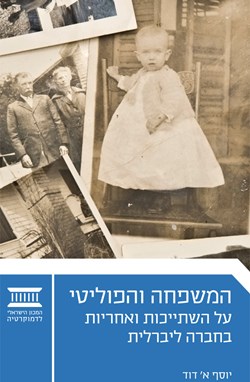The Family and the Political
- Written By: Joseph David
- Publication Date:
- Cover Type: Softcover | Hebrew
- Number Of Pages: 83 Pages
- Price: 64 NIS
This book examines the tension between family and liberal thought as a development of the subversive momentum. It outlines three solutions for settling the tension between the institution of family and liberal thought: the family as an agent of the state; the family as an organ of the state; or the family as an apolitical zone.
The relationship of modern liberalism vis a vis the religious and cultural traditions that preceded it is an ambivalent one. On the one hand, it embodies the realization of the principles of freedom and humanity rooted in the Bible which developed within the religions that stemmed from it; on the other hand, it marks a fault line and disconnect between the traditional world and the liberal-modern one. As far as the institution of family is concerned, the establishment of the principle of personal freedom and the perception of the individual as an autonomous being with rights constitute not only a turning point from the old world, but also a process resulting in the unraveling and dismantling of a traditional institution that insists on existing. Viewing liberalism as a watershed line and as a crucial junction in the history of moral and political theories carries great significance with regard to understanding the limits of liberalism and the relationship of liberal thought in relation to traditional and religious institutions. However, blurring the fault line of liberalism leads to ignoring the effects of its encounter with the traditional institution of family. According to the analysis suggested here, liberalism should indeed be perceived as an expression of the liberation movement; it therefore carries within it an element which dismantles and destroys, an ingredient of destruction or shattering of sources of authority, stability and security enjoyed by pre-liberal social institutions such as family.
The institution of family carries many meanings today: It is an expression of blood ties and genetic relationships; the nucleus of social life and personal identity; a cell that establishes the individual's emotional sense of self and his or her personality; a framework of contractual rules, rights, and legal obligations; a space for expression of love, responsibility, and caring. The analysis presented in this book focuses on a meaning of family which has received only scant attention —the political meaning of the family: To what extent does the existence of the family in liberal society serve political goals or interests? Does liberalism have a position regarding family patterns which the state may support, or is required to? What is the connection between the individual's liberty and autonomy and the preference of certain institutions over others? Will the family in liberal society enjoy prosperity and vitality in the future, or alternatively, is it condemned to degeneration or at best, to mere survival?
While ethics and political theory are focused on relationships between individuals and between individuals and society as a whole, family does not have a clear political role, and liberal theory does not offer a satisfactory treatment of the institution of family. This book offers to examine the tension between family and liberal thought as a development of the subversive momentum. It outlines three solutions for settling the tension between the institution of family and liberal thought: the family as an agent of the state; the family as an organ of the state; or the family as an apolitical zone.
The approach that views family as an agent of the state seemingly accepts the loss of the family's traditional status and its collapse into the liberal way of life. In line with liberalism's concern with the individual's rights, family, according to this approach, is nothing but an artificial, replaceable framework intended to provide the basic conditions for the individual's existence and prosperity. An analysis of this approach exposes the ideological proximity between the principles of political liberalism and paternalism. The perception of family as an organ of the state preserves its uniqueness as a framework whose existence and justification does not depend on the political. It places the family in a supportive alignment, where the state's responsibility and its commitment to protect and preserve the institution of family also grants it the authority to supervise the family and what occurs within it. This approach is consistent with the idea of community, and provides a tangible sense to the perception of the family as a kind of autonomy, rather than a mere ensemble of individuals. The concept of family as a locus, where the power of the state is suspended, encourages the view of family as a place independent of politics. Accordingly, family enables the establishment and management of interpersonal relationships based on operational principles that differ from those governing the political arena. The family, thus, marks the political boundaries, confirms their existence and emphasizes the possibility of escape from the political scene, exit from it, and re-entry to it.
Many aspects of the public agenda relate directly or indirectly to the status of family in the liberal state. The analysis presented here demonstrates how each of these three directions offers a different rationale and balance between the family and the state. The three concepts of family analyzed above form three distinct concepts of family in the liberal context: family as a legal construction, family as a generator of identity and meaning, and family as an expression of privacy.

